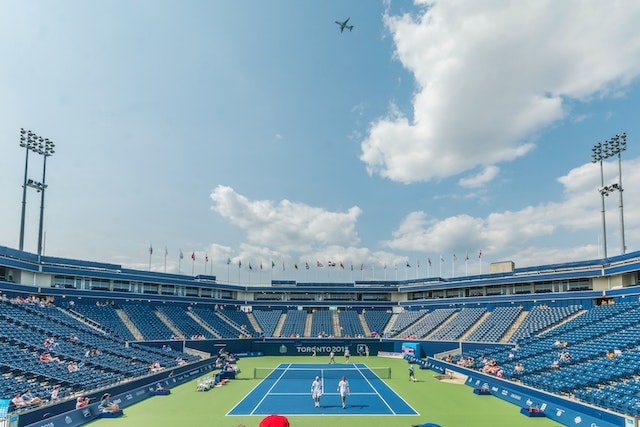Benefits of Sustainable Venues for Sporting Events
In recent years, a heightened focus on sustainability has permeated various industries, including the realm of sports event planning. As environmental consciousness becomes a driving force, the demand for eco-friendly venues has surged. Hosting a sports event in alignment with sustainable principles not only diminishes the carbon footprint but also underscores a commitment to social responsibility. In this article, we delve into the concept of sustainable sports venues and highlight premier choices for hosting environmentally conscious events.
Green Building Certifications
Ensure your sports venue holds esteemed green building certifications like LEED, BREEAM, or Green Star, ensuring construction and operations align with environmentally responsible practices.
Energy Efficiency
Opt for sports venues that prioritize energy efficiency, employing measures such as energy-efficient lighting, HVAC systems, and renewable energy sources like solar panels or wind turbines.
Waste Management
Sustainable sports venues should implement effective waste management practices, including recycling programs and commitments to reduce single-use plastics, significantly minimizing the environmental impact of sports events.
Water Conservation
Look for sports venues with water-saving fixtures such as low-flow toilets and faucets, and consider those with rainwater harvesting systems for irrigation, showcasing a commitment to preserving this precious resource.
Transportation and Accessibility
Choose sports venues easily accessible by public transportation or equipped with bike racks, encouraging attendees to use sustainable transportation methods and reducing the event’s carbon footprint.
Sustainable Catering Options
Prioritize sports venues offering sustainable catering options, featuring locally sourced, organic, and vegetarian or vegan menu choices to positively influence the environmental impact of event dining.
Green Spaces and Outdoor Areas
Opt for sports venues with green spaces and outdoor areas to capitalize on natural lighting, ventilation, and an opportunity to incorporate nature into the event design, enhancing sustainability.
Environmental Education
Some sports venues go beyond sustainable practices, offering educational programs or tours to raise awareness about environmental issues, contributing to the overall eco-conscious atmosphere of the event.
Top Choices for Sustainable Sports Venues
Embark on a journey through the world of eco-conscious sports venues, where sustainability meets cutting-edge design and innovation. Ensuring accuracy in the locations:
Empower Field at Mile High – Denver, Colorado
An exemplary LEED-certified sports venue, Empower Field at Mile High in Denver features cutting-edge sustainable technologies, energy-efficient lighting, and a commitment to waste reduction.
Johan Cruijff Arena – Amsterdam, Netherlands
Johan Cruijff Arena, located in Amsterdam, stands as a pinnacle of sustainable sports venues, incorporating solar energy, rainwater harvesting, and innovative waste reduction practices.
SolarPark Arena – Munich, Germany
The SolarPark Arena in Munich, Germany, is renowned for its sustainability initiatives, powered by solar energy and boasting advanced waste management systems, setting a benchmark for eco-friendly sports venues.
GreenPitch Stadium – India
GreenPitch Stadium, located in India, blends modern design with eco-friendly features, utilizing geothermal energy, a green roof for insulation, and offering locally sourced and organic catering options.
Rogers Arena – Vancouver, Canada
Rogers Arena, situated in Vancouver, stands as a former industrial site transformed into a sustainable sports venue, prioritizing waste reduction, water conservation, and sustainable transportation.
Conclusion
By opting for a sustainable sports venue, event planners not only contribute to environmental preservation but also set a precedent for future eco-conscious gatherings. Consider green building certifications, energy efficiency, waste management, water conservation, transportation options, catering choices, outdoor spaces, and educational initiatives when selecting a sports venue, fostering a more sustainable future for sports event planning.
Key Takeaways:
- When selecting a sustainable venue, consider green building certifications like LEED, BREEAM, and Green Star to ensure environmental responsibility.
- Energy efficiency is crucial, so look for venues with energy-saving measures and renewable energy sources.
- Effective waste management practices, such as recycling and composting, should be in place at sustainable venues.
- Water conservation strategies, such as low-flow fixtures and rainwater collection, are important for sustainable venues.
- Choose venues that are easily accessible by public transportation and offer bike racks to encourage sustainable transportation methods.
- Opt for venues that offer sustainable catering options, such as locally sourced and organic food, to minimize the environmental impact.
- Consider venues with green spaces and outdoor areas to reduce the need for artificial lighting and air conditioning.
- Some venues offer educational programs or tours to raise awareness about environmental issues, providing attendees with an opportunity to learn and engage in sustainability efforts.
If you’re interested in furthering your knowledge in the field of event planning and sustainability, consider taking the “NYU Fundamentals of Global Sports Management” online course and certificate program offered by Yellowbrick. This program can provide valuable insights and skills to help you excel in the industry.







